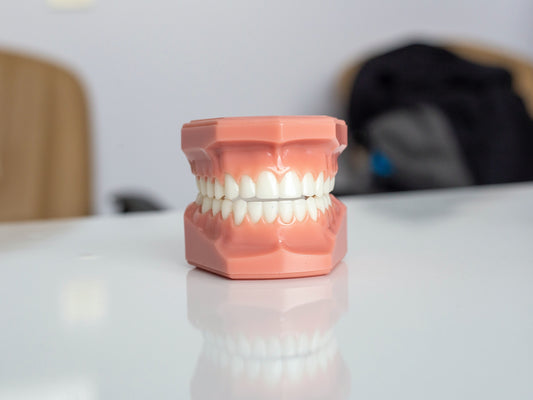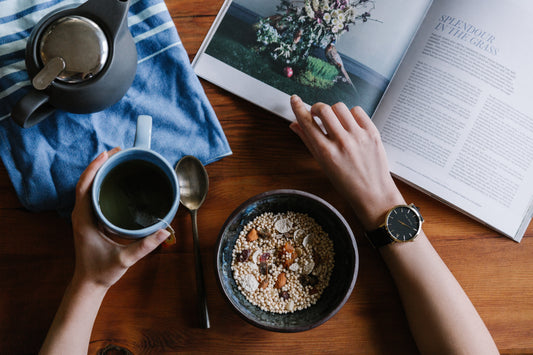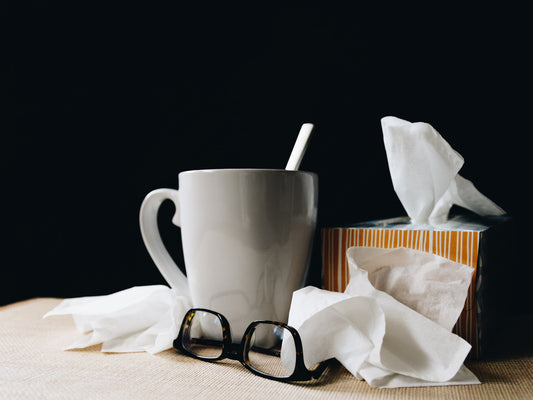More than ever, people want to build and maintain strong immune systems as part of their daily wellness goals and routine[1]. Without a strong immune system, a person faces a greater risk of potentially contracting infections from bacteria and viruses, as well as possibly developing other immune-related disorders [2].
Are you wondering what you can do to support your immune system?
We've got you. We dug deep into scientific research and determined what experts name as the best ways people can support their immune systems. As it turns out, consuming the right foods and nutrients can help to boost your immune system as part of a wellness routine [3].
While a variety of foods are considered immune-supporting, this article focuses on the ginger root. Before we dive into the details of how ginger positively impacts the body, let's zoom out and take a closer look at the immune system itself.

Why Is the Immune System Important?
The human immune system is important because it protects our bodies from infection and damage. Our immune system is constantly on guard against the wide variety of bacteria, viruses, parasites, and fungi that are present in our environments [4].
These microbes are invisible to the naked eye, and many of them view the human body as a potential home. When they try to move in, however, the adaptive immune system kicks into gear and begins defending its territory. This part of the immune system is considered adaptive because it can "learn" how to better protect us against specific microbes over time [4]. It develops antibodies to these microbes, building up our defenses. This process is the reason vaccines work and why most people develop immunity to certain "bugs" after becoming infected by them.
The innate immune system also protects against other foreign substances and even harmful internally-created cells, such as cancer cells [4]. This part of the immune system doesn't learn in the same way, but its role is equally important.
When the immune system is weak, harmful microbes and substances can take over, causing illness or even death. When the immune system malfunctions, it kicks into gear unnecessarily. The result is unwanted allergic reactions or auto-immune disorders [4].
Once people understand the importance of the immune system, they tend to wonder if they can improve theirs.
Can the Immune System Become Stronger?
Yes, the human immune system can become stronger or weaker over time. Research shows that the quality of an immune system varies significantly from person to person [5]. Many factors influence the state of any individual person's immune system.
Although genetics do influence the immune system, other factors have an even greater influence on it [5]. Experts recognize that the following factors impact the immune system:
- Diet and nutrition
- Vaccinations
- Cigarette smoke
- Recent infections
- Age
- Season
Even though they are not genetic, not all of these factors fall within our control. For example, we can't choose our age (unfortunately!) or control the seasons.
We can, however, make efforts in the areas in which we have control. For example, we can choose to consume healthy, immune-boosting foods, stay up-to-date on recommended vaccinations, and avoid smoking and being exposed to secondhand cigarette smoke.
Eating ginger is one of the immune-supporting foods we may choose to add into our broader wellness routine. While eating ginger does not have evidence for preventing or curing any specific disease, some studies have shown interesting interactions with the immune system as a whole.

What Is Ginger?
"Ginger" refers to the thick root, also called a rhizome, of the Zingiber officinale plant [6]. The plant is most likely native to Southeastern Asia. For many years, it's been used as a food, spice, flavoring, and form of traditional medicine.
People in the Western world likely know ginger best as the flavoring in ginger ale and gingerbread cookies. The root is also commonly used in Indian, Thai, Chinese, and other Asian cuisines. Ginger is also used to make tea and can be purchased in supplement form.
In addition to providing a distinct flavor, ginger packs some heat. This spiciness likely comes from polyphenols in the root, particularly, compounds called gingerol and shogaol [7].
Chemically, gingerol is similar to capsaicin, the compound that gives chili peppers their spiciness. Generally, fresh ginger is spicier than cooked ginger because of the way heat affects gingerol. Researchers believe that gingerol could also be the compound responsible for many of ginger's health benefits [8].
How Does Ginger Support the Immune System?
Ginger primarily supports the human immune system by acting as an antioxidant and anti-inflammatory. Let's focus on each of these functions individually.
Ginger's Antioxidant Properties
When cells in the human body use oxygen, they create byproducts called free radicals [9]. In small amounts, free radicals are neutral or even positive in how they affect the body.
Problems begin when the body becomes overloaded with free radicals and experiences oxidative stress. In modern times, oxidative stress is unfortunately common. Many factors increase the amount of free radicals in the body [9]:
- Pollution
- Cigarette smoke
- Radiation
- Medication
Oxidative stress often contributes to or worsens infections, specifically those caused by viruses [10]. Ginger, because of its antioxidant compounds, can possibly play a supporting role here. Antioxidants are thought to essentially “turn off” free radicals, neutralizing their negative impact and restoring balance in the body.
Ginger appears to be teeming with these powerful antioxidants. One research team was able to isolate over 50 individual antioxidants within ginger [11].
Ginger's Anti-Inflammatory Properties
When the human immune system recognizes that a potentially damaging microbe is trying to colonize part of the body, it begins an attack. Inflammation is part of this immune response process [12].
In small doses, inflammation is good. You develop a fever due to inflammation to help fight an infection. The skin around a wound becomes red and swollen due to inflammation. These are protective measures. In a healthy body, this inflammation only lasts a short time, until the threat has passed.
Many people experience low-grade chronic inflammation much of the time, however [12]. When inflammation occurs for too long, it's no longer protective. Instead, it can weaken the immune system and lead to further infection and disease.
Ginger and other spices have been shown to play a role in fighting this chronic inflammation [12]. Many people may sip a cup of ginger tea or suck on a ginger candy to help with inflammation and ease their symptoms.

Can Ginger Help Fight Viruses?
Studies have found ginger to have antiviral properties against the following viruses:
- H9N2 Influenza ("Avian Flu") [13]
- Feline Calicivirus (surrogate for human norovirus) [14]
- Human Respiratory Syncytial Virus (HRSV) [15]
- Chikungunya Virus (CHIKV) [16]
Researchers also have not yet studied what impact, if any, ginger has on the COVID-19, or the novel coronavirus. Some experts do believe diet and nutrition could potentially provide some help against COVID-19 by boosting the immune system, however [3].
It’s important to remember that while ginger has been used to positive effect in studies on viruses, it likely won’t help significantly, and it’s always recommended to consult with your doctor if you’re having any symptoms. That said, it’s a great food to add into a wellness routine to help support broader immune health.
Does Ginger Have Any Side Effects?
Most people who consume ginger don't experience side effects at all [18].
Some people experience digestive problems if they consume large amounts of ginger, however. Also, since ginger is known to lower blood pressure and reduce clotting, people who already have low blood pressure or trouble with blood clotting could experience an increased risk of bleeding after consuming ginger.
Ginger and Hydration
When creating our new Immunity products, it was important to us to include Ginger extract in our ingredients list because of the benefits found in numerous studies. We also love its spiced, herbal taste making it a great compliment to our Lemon Ginger and Hot Apple Cider flavors. With our new Immunity products, we wanted to provide products to our customers that not only hydrate them but help them meet their daily wellness needs—no matter the season.
Takeaway
Because of its antioxidant and anti-inflammatory properties, ginger supports the human immune system. Since most people experience little to no side effects from ginger, this spicy root is worth adding to your diet if you're looking for something to strengthen your wellness routine.
<!-- split -->



























